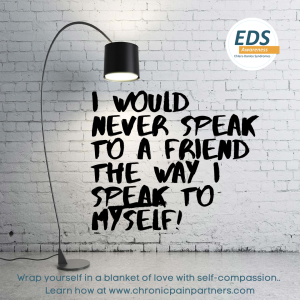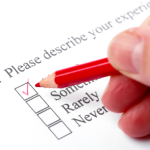Self-compassion (and self-care) are sometimes misunderstood as selfish, self-cherishing, or self-indulgent, but this couldn’t be further from the truth, especially when you live with chronic illness or chronic pain such as Ehlers-Danlos syndrome (EDS). Self-compassion is the act of offering ourselves the same care and compassion we would give to others. It is simply the fine art of being your own best friend. Sounds easy. But giving ourselves grace isn’t always easy to do. So, we dedicate this month’s topic to the month of love, February, to explore how to increase your self-love.
The bottom line is that self-compassion invites us to be kind to ourselves rather than judgmental. The information-overloaded social media craze can leave us very critical of ourselves, living in jealousy and thought processes of “lack” rather than “abundance.” Self-compassion reminds us that we’re never alone in our pain and suffering. We are reminded that other zebras are going through similar struggles, and we are not alone. Recognizing this helps us to become more emotionally regulated, better able to stay calm when faced with life’s challenges, and more resilient to hardship and stress. Improved self-compassion plays out in medical research on how meditation makes us happier and better cope with EDS.
What is Self-Compassion?
Leading self-compassion researcher, Kristin Neff, describes self-compassion as “being touched by and open to one’s own suffering, not avoiding or disconnecting from it, generating the desire to alleviate one’s suffering and to heal oneself with kindness.”
The ability to observe our pain and suffering without judgment and then intentionally respond to it most appropriately sounds like mindfulness. Can we be more present in our bodies and cut ourselves some slack even when feeling our worst? It takes practice, which is why mindfulness and meditation are called “practice.”
Self-compassion and mindfulness can enhance each other. Being open to the idea of tending to ourselves is not a cakewalk. Still, we must start by observing our condition and appreciating just how challenging it can be. Let’s face it, life with EDS can really suck! But to learn how to develop these skills, lets better understand self-compassion by breaking it down into its three main components.
- Self-Kindness vs. Self-Judgment
We have all experienced the inner critic’s voice, even the imposter. The one who derides blames, or shames us for making mistakes, failing to meet expectations, or not getting what we want, especially having been chronically dismissed by others. Sometimes, we judge ourselves too harshly in ways we would never judge a friend. I talk to myself in ways I would not allow anyone else to talk to me! Self-compassion helps transform this inner critic into a soothing voice of understanding, acceptance, and care. Life for many of us has its disappointments. When we fight against this, we increase the suffering. With self-compassion in our toolkit, we can better weather disappointment with grace and emotional stability.
BONUS: If you need tactics on teaching others how to talk to you when you’re facing a health crisis or chronic illness (once you’ve quieted your own inner critic) check out the flip book Dear Loved One from author of Holding It All Together When You’re Hypermobile Christie Cox. She discusses tips to share with those who love you, care for you, but cannot figure out how to say it well.
- Common Humanity vs. Isolation
When things don’t go as we’d like them to, or we fail to get what we want, we can feel isolated in our experience. We can feel very invalidated in the EDS struggle. When uncomfortable emotions arise, it’s easy to feel alone, as if nobody else would understand. But the truth is, our being human means we’re flawed. Plus being a zebra means we have unique stripes and patterns that are harder to predict and throw us off base. We’ll make mistakes, experience loss, and be forever imperfect, just like every human who has come before us and will come after us. Self-compassion encourages us to identify more with our common humanity, especially other zebras, and less as separate, disconnected individuals. Remembering we’re never alone can help soften our pain.
- Mindfulness vs. Over-Identification
When we over-identify with thoughts or emotions, we become consumed by them and rumination begins. We cannot gain a healthy perspective without distance between ‘me’ and the thought or feeling. We may not even notice that we’re in pain or participating in negative self-talk subconsciously. It’s here where we experience great suffering and tend to act in ways that further harm ourselves and our relationships.
Mindfulness is the antidote to over-identification. Yes, I just claimed to have a remedy! Before you stop reading and dismiss this idea, have you tried it yet? With mindfulness, we recognize emotions as they arise, just noticing them for what they are, with acceptance rather than judgment. We may not like what we’re feeling, but we feel it and allow it. Giving our emotions the love and attention they need is self-compassion in action. It’s giving yourself the ‘blanket of love’ with grace.
Conceptually, self-compassion and its three elements might be easy to understand. But the hard work of putting self-love into practice is an entirely different matter. Many of us have spent our lives practicing self-criticism, judgment, and emotional suppression. By becoming more on self-compassionate, we intentionally cultivate the opposite.
Benefits of Self-Compassion
- Decreased shame
- Improved body image
- Reduced fear reactivity
- Strengthened resilience
- Reduced rumination
- Improved mental health
- Increased compassion for others
Suppose you want to learn more about cultivating this habit. In that case, there are several different types of meditation that can foster self-compassion. Try searching for self-compassion meditations developed by leaders in mindfulness to learn more using these terms:
- The Compassionate Body Scan
- Loving Kindness Meditation
- Affectionate Breathing
- The Self-Compassion Break
Additional Tips for Self-Compassion
Self-care and self-compassion are not the same, but the two are interconnected. Those with greater self-compassion are more likely to practice self-care. An act of true self-care can also help foster self-compassion. Any intentionally self-compassionate action qualifies as true self-care. So try a few acts of self-love to get what you need from the one person who is and will always be there with you – YOU! Below are a few examples of ideas:
- Set boundaries. Be aware of where you would like to say no in your life, and give yourself a permission slip to do so.
- Care for your body. Care for your body by eating well, sleeping well, and exercising, as you can foster wellbeing.
- Use touch. Place a hand on your heart, hold your face in your hands, or give yourself a hug. This somatic practice soothes the nervous system and helps us feel loved.
- Write a self-compassion letter. If a loved one was experiencing a moment of pain, how would you respond? Write a letter to yourself using this same language. Use these instructions on exactly how to compose such a letter with this free guide “Goodnight Mind.”
- Try meditation, if only once. Any regular meditation practice, whether explicitly for self-compassion or not, can help improve your overall wellbeing. Give it a try by listening to this 10-minute guided ‘self-compassion pause’ meditation for a few moments to appreciate your own best friend in you.
Addition Reading on Self Compassion While Living with Chronic Illness
5 WAYS TO FIND SELF-LOVE WHEN CHRONICALLY ILL
https://www.brainlesionandme.com/5-ways-to-find-self-love-when-chronically-ill/
FINDING SELF-COMPASSION WHEN LIVING WITH CHRONIC ILLNESS
https://www.greentpsychology.com/psychologyofchronicillness/2017/9/19/finding-self-compassion-when-living-with-chronic-illness
Chronic Pain Partners Media Team
February 2023



